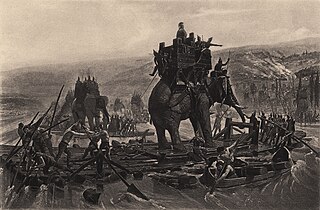Related Research Articles

The 3rd century BC started the first day of 300 BC and ended the last day of 201 BC. It is considered part of the Classical era, epoch, or historical period.
This article concerns the period 229 BC – 220 BC.
Year 241 BC was a year of the pre-Julian Roman calendar. At the time it was known as the Year of the Consulship of Atticus and Cerco. The denomination 241 BC for this year has been used since the early medieval period, when the Anno Domini calendar era became the prevalent method in Europe for naming years.

This article concerns the 200 BC decade, that lasted from 209 BC to 200 BC.
This article concerns the period 159 BC – 150 BC.
This article concerns the period 279 BC – 270 BC.
This article concerns the period 269 BC – 260 BC.
This article concerns the period 259 BC – 250 BC.
This article concerns the period 249 BC – 240 BC.
This article concerns the period 239 BC – 230 BC.
This article concerns the period 219 BC – 210 BC.
This article concerns the period 189 BC – 180 BC.
This article concerns the period 199 BC – 190 BC.
Year 260 BC was a year of the pre-Julian Roman calendar. At the time it was known as the Year of the Consulship of Asina and Duilius. The denomination 260 BC for this year has been used since the early medieval period, when the Anno Domini calendar era became the prevalent method in Europe for naming years.
Year 204 BC was a year of the pre-Julian Roman calendar. At the time it was known as the Year of the Consulship of Cethegus and Tuditanus. The denomination 204 BC for this year has been used since the early medieval period, when the Anno Domini calendar era became the prevalent method in Europe for naming years.
Year 195 BC was a year of the pre-Julian Roman calendar. At the time it was known as the Year of the Consulship of Flaccus and Cato. The denomination 195 BC for this year has been used since the early medieval period, when the Anno Domini calendar era became the prevalent method in Europe for naming years.
Year 228 BC was a year of the pre-Julian Roman calendar. At the time it was known as the Year of the Consulship of Ruga and Verrucosus. The denomination 228 BC for this year has been used since the early medieval period, when the Anno Domini calendar era became the prevalent method in Europe for naming years.
Year 261 BC was a year of the pre-Julian Roman calendar. At the time it was known as the Year of the Consulship of Flaccus and Crassus. The denomination 261 BC for this year has been used since the early medieval period, when the Anno Domini calendar era became the prevalent method in Europe for naming years.

The Battle of Agrigentum was the first pitched battle of the First Punic War and the first large-scale military confrontation between Carthage and the Roman Republic. The battle was fought after a long siege which started in 262 BC and resulted both in a Roman victory and the beginning of Roman control of Sicily.

Hellenistic Greece is the historical period of the country following Classical Greece, between the death of Alexander the Great in 323 BC and the annexation of the classical Greek Achaean League heartlands by the Roman Republic. This culminated at the Battle of Corinth in 146 BC, a crushing Roman victory in the Peloponnese that led to the destruction of Corinth and ushered in the period of Roman Greece. Hellenistic Greece's definitive end was with the Battle of Actium in 31 BC, when the future emperor Augustus defeated Greek Ptolemaic queen Cleopatra VII and Mark Antony, the next year taking over Alexandria, the last great center of Hellenistic Greece.